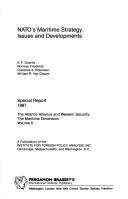| Listing 1 - 10 of 203 | << page >> |
Sort by
|
Book
ISBN: 9781884733499 Year: 2008 Publisher: Newport, RI : Naval War College Press,
Abstract | Keywords | Export | Availability | Bookmark
 Loading...
Loading...Choose an application
- Reference Manager
- EndNote
- RefWorks (Direct export to RefWorks)
Book
ISBN: 9781682473818 Year: 2019 Publisher: Annapolis, MD : Naval Institute Press,
Abstract | Keywords | Export | Availability | Bookmark
 Loading...
Loading...Choose an application
- Reference Manager
- EndNote
- RefWorks (Direct export to RefWorks)
This book is a deliberately compact introductory work aimed at junior seafarers, those who make decisions affecting the sea services, and those who educate seafarers and decision-makers. It introduces readers to the main theoretical ideas that shape how statesmen and commanders make and execute maritime strategy in times of peace and war.
Book
ISBN: 2130373798 9782130373797 Year: 1982 Publisher: Paris: PUF,
Abstract | Keywords | Export | Availability | Bookmark
 Loading...
Loading...Choose an application
- Reference Manager
- EndNote
- RefWorks (Direct export to RefWorks)
Book
ISBN: 2130658075 2130695574 Year: 1982 Publisher: Paris (6, avenue Reille 75685) : P.U.F.,
Abstract | Keywords | Export | Availability | Bookmark
 Loading...
Loading...Choose an application
- Reference Manager
- EndNote
- RefWorks (Direct export to RefWorks)
Cette édition numérique a été réalisée à partir d'un support physique, parfois ancien, conservé au sein du dépôt légal de la Bibliothèque nationale de France, conformément à la loi n° 2012-287 du 1er mars 2012 relative à l'exploitation des Livres indisponibles du XXe siècle.
Book
ISBN: 168247710X 9781682477106 9781682477052 Year: 2021 Publisher: Annapolis, Maryland
Abstract | Keywords | Export | Availability | Bookmark
 Loading...
Loading...Choose an application
- Reference Manager
- EndNote
- RefWorks (Direct export to RefWorks)
Habits of Highly Effective Maritime Strategists is a deliberately compact work aimed at both current and aspiring strategists, especially those who concern themselves with strategy at sea, and at those who work for or alongside them. The volume is meant to help strategic leaders know and educate themselves, two of the most important enterprises in the field of leadership. James R. Holmes reaches back to the classics of philosophy-especially to the works of Aristotle, the founder of the Lyceum-to posit that strategy is a habit. Rather, he writes, it involves cultivating a family of habits. To excel at strategy, one should learn what excellent strategists do and practice that ritual each day. Repetition helps the strategist find virtue, which Aristotle defined as the "golden mean" between the extremes of some trait, while shunning vice, the excess or deficiency of that trait. Over time, it becomes second nature to take the long view of national political and strategic ends; marshal diplomatic, economic, and military resources; and devise ways to put those resources to work for strategic gain. The classics of strategy feature prominently in this work. The canon sets forth concepts worth mastering. For instance, Carl von Clausewitz exhorts strategists to amass superior forces at the decisive place and time while abjuring secondary commitments that scatter resources about the map and risk leaving each force too weak to accomplish its goal. In a similar vein Alfred Thayer Mahan devises a formula for sizing fleets to overpower foes in important waters or coastal zones. Sun Tzu espouses the "indirect approach" to strategy, and B. H. Liddell Hart and J. C. Wylie join the classical Chinese general in his advocacy. In the ideal case strategists not just learn but internalize these concepts. Harnessing them in the real world becomes effortless.
Book
ISBN: 1682473821 9781682473825 9781682473825 9781682473818 1682473813 Year: 2019 Publisher: Annapolis, Maryland
Abstract | Keywords | Export | Availability | Bookmark
 Loading...
Loading...Choose an application
- Reference Manager
- EndNote
- RefWorks (Direct export to RefWorks)
A Brief Guide to Maritime Strategy is a deliberately compact introductory work aimed at junior seafarers, those who make decisions affecting the sea services, and those who educate seafarers and decision-makers.
Book
Year: 1995 Publisher: Newport, RI : Naval War College Press,
Abstract | Keywords | Export | Availability | Bookmark
 Loading...
Loading...Choose an application
- Reference Manager
- EndNote
- RefWorks (Direct export to RefWorks)
Book
ISBN: 1884733328 Year: 2004 Publisher: Newport, RI : Naval War College Press,
Abstract | Keywords | Export | Availability | Bookmark
 Loading...
Loading...Choose an application
- Reference Manager
- EndNote
- RefWorks (Direct export to RefWorks)
Book
Year: 2006 Publisher: Newport, RI : Naval War College Press,
Abstract | Keywords | Export | Availability | Bookmark
 Loading...
Loading...Choose an application
- Reference Manager
- EndNote
- RefWorks (Direct export to RefWorks)

ISBN: 0080355447 Year: 1987 Publisher: Washington : Pergamon-Brassey's,
Abstract | Keywords | Export | Availability | Bookmark
 Loading...
Loading...Choose an application
- Reference Manager
- EndNote
- RefWorks (Direct export to RefWorks)
| Listing 1 - 10 of 203 | << page >> |
Sort by
|

 Search
Search Feedback
Feedback About UniCat
About UniCat  Help
Help News
News